Prologue | Intro | 1 | 2 | 3 | 4 | 5
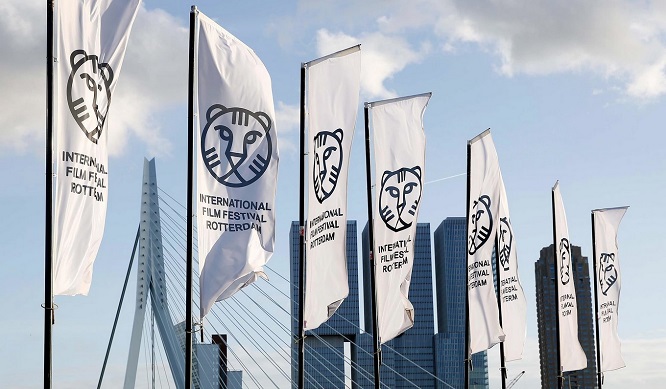
[IFFR]
The International Film Festival Rotterdam (IFFR) began in 1972. It was always a paradox, an A‑list fest that made a home for outcasts and marginals; never mind auteur cinema, this was basement cinema, neighbourhood cinema made by refuseniks and marginals. The fest has gone through many changes in the last 50 years, but none greater than the eruption of the past year.
What happened at the Rotterdam film fest? Neoliberalism. In a classic neolib move, the bosses (festival director Vanja Kaludjercic and managing director Marjan van de Haar) fired or bullied out more than 40 employees. Full-time programming staff were replaced by part-time gig workers. On April 13, 2022, the staff were summoned for a morning meeting where they were told about the restructuring for the first time. In the afternoon, in a series of five-minute meetings, they were fired. Some had worked for the Festival for many years. Take your white envelope and leave.
All the newly precarious programmers will be overseen by Kaludjercic, who already had staff submitting their picks to her for approval. She has appointed herself the programmer of the programmers.
The cover story is about a loss of 2 million Euros due to lost ticket fees during COVID. The staff proposed an across-the-board wage cut of 15% to make up the difference. But the changes in Rotterdam are not about money, they are about accountants taking control. The Board understands the Festival as a business; so, in order to sweep away the long-term contracts of a staff that continued to champion non-commercial cinema, they used the deficit as a bait-and-switch. Let’s ditch the union fat cats plus their left field tastes. It’s win-win.
As Naomi Klein described in her seminal The Shock Doctrine, every disaster presents an opportunity. “It was in 1982 that Milton Friedman wrote the highly influential passage that best summarizes the shock doctrine. ‘Only a crisis—actual or perceived—produces real change.’ When the crisis occurs, the actions that are taken depend on the ideas that are lying around.” The ideas that were lying around Rotterdam are a commonplace in big tech institutions, and increasingly the usual in the business-first enterprises of “successful” A-list festivals. The Board prioritized money over experience, sponsors over artists, while creativity would be reserved for new marketing schemes. No longer would the accountants need to be held in check by the nerds in the programming department. Now, they would run the whole Festival, which has been dramatically restructured.
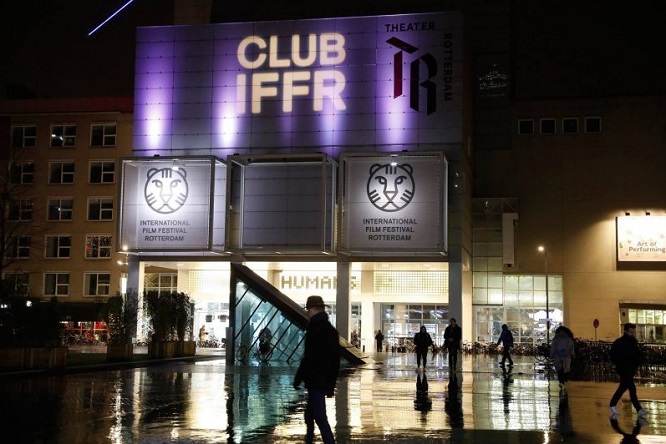
Edo Dijksterhuis, Filmkrant: “In the coming week, the new programmers of the International Film Festival Rotterdam will be presented in Cannes. They replace the substantive core team that was recently dismissed by the management. There is a lot of anger about the way in which that has happened and fear that the specific Rotterdam Festival DNA will disappear with this reorganization.” [1]
Former Rotterdam programmer Shelly Kraicer: “This is a conception of the cinema ecosystem that eliminates, or at best marginalizes, the art, the artists, the programmers/curators, and a stimulated, intelligent audience that’s part of a community engaged in collaborative experience.” [2]
Film critic/journalist/programmer Flavia Dima: “When a festival and a team go down, it’s more than just the audience’s encounter with it that disappears: what also goes lost is one’s access to the knowledge of its creators, shaped by years of hard work, one that is equally about cinema and its infrastructure; lists of hundreds, thousands of films and contacts turn from living objects into artifacts that can either be studied or, more often, just abandoned in the dusty corners of some email inbox or another.” [3]
Former Rotterdam programmer Julian Ross (Twitter, April 30, 2022): “I’m hurt by what happened and I’m concerned about what is happening at the Festival. Solidarity with all the programmers and staff who were let go. We need to talk about the precarity of festival work; we deserve better.”
Cultural press agency Cultuurpress: “What is going on in Rotterdam? Will the IFFR still be that groundbreaking festival where the distance between audience and maker is so small? The festival where you can see small, fragile films, discover new directors, and see things that you don’t understand but that do fascinate you?” [4]
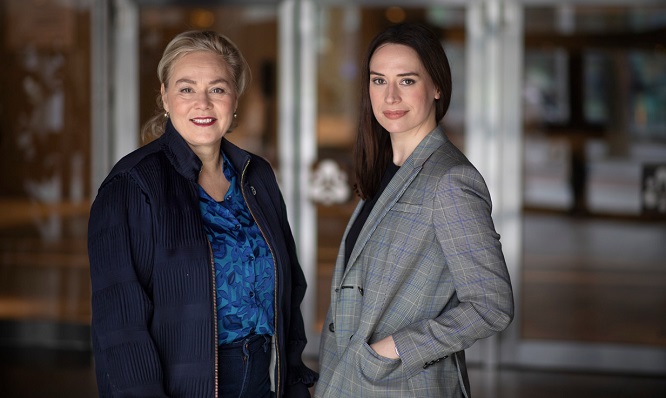
:: Managing Director Marjan van de Haar with Festival Director Vanja Kaludjercic [photo: Andreas Terlaak/IFFR]
Columnist Eric Kohn: “Current artistic director Vanja Kaludjercic took over from Netherlands Film Fund CEO Bero Beyer in late 2019… Some complained to me about a sudden loss of autonomy: Rather than trust programmers to make key decisions, any film had to be submitted to a separate committee headed by Kaludjercic for approval. Programmers said they started to feel more like outside consultants than senior members of the programming team. ‘There were no normal discussions about films anymore,’ one former staffer told me. ‘It felt like Vanja just wanted to make the program herself.’” [5]
Former Rotterdam programmer Peter Taylor (Facebook, May 10, 2022): “I was a volunteer at IFFR for three years, followed this with an internship and had a paid programming position for 8 or 9 years. The most I earned in a year at IFFR was just over 4,000 Euros. I was one of a minority of programmers living and working in Rotterdam year-round. Paid jobs for film programmers are so scarce that they will not speak in solidarity with colleagues and other festival workers until they have already lost their jobs. And let’s not forget freelancers don’t get leaving parties. One minute they’re there, next minute they’re gone. Contracts terminated or simply not renewed.
The people and communities whom festivals like IFFR are built upon do not get the film festivals they deserve. The very least a film festival could do is speak honestly about the structural inequalities upheld by its own practices and then set about addressing these. There should be no fanfare, no press release, just deliberate action and work.”
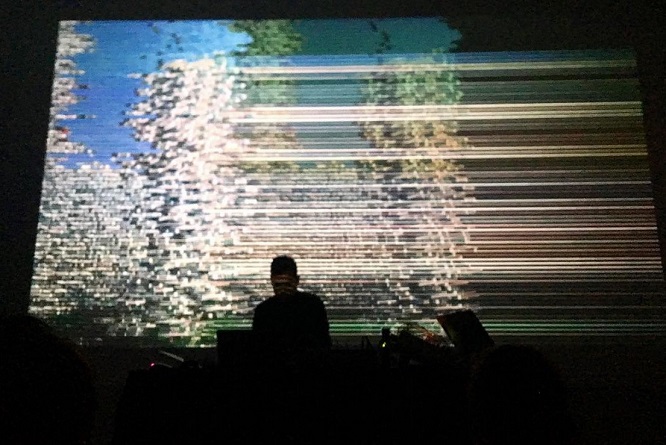
:: Go Back to Hiding in the Shadows, audiovisual performance by Pandelis Diamantides (2018-2019) [IFFR]
The Rotterdam Festival has been carved up into five divisions: communication and audience reach, funding and business growth, business affairs, operations and content. “Content” equals artists and movies, what many had mistaken for the fest itself. The management coup d’état (and what are Facebook, Uber, Google, etc. but successive management coups?) has given movies a backseat at a movie festival. Business uber alles. As an outraged editorial in the national Dutch paper Volkskrant put it, “Film itself is then no longer the goal. It will be a means to keep the Festival afloat.”
Whenever I attended, it felt like there was a small festival tucked inside the big-name brand, filled with unusual moments gathered from round the world, where outlier artists were easily embraced and fest dinners and performance evenings offered a bounty of meeting opportunities. The importance of offscreen space was never lost to the organizers. Somehow they had a genius for the unorganized, the unrehearsed and the unexpected. It was a vision of what the “Experimental Film Congress” never became, an international consort, an ever-changing array of guests, a concern with opening the door and diversity. No one had the last word, or made the last movie. Our heroes changed every night. It was a global village, an uncommon cause, and made room for Internet artists and film lab purists, queer Arab forays and movies that lasted just a minute, or ten hours, with slide shows, installations and new forms of expanded cinema thrown in for good measure. The people who were fired were at the heart of this shifting assemblage. They used their deep community roots not to throw the good old days into everyone’s face, but to show the fissures and continuities so that we might begin to believe again. Even the failures inspired me. Especially the failures.

:: Maskirovka (Tobias Zielony, 2017) [Tobias Zielony]
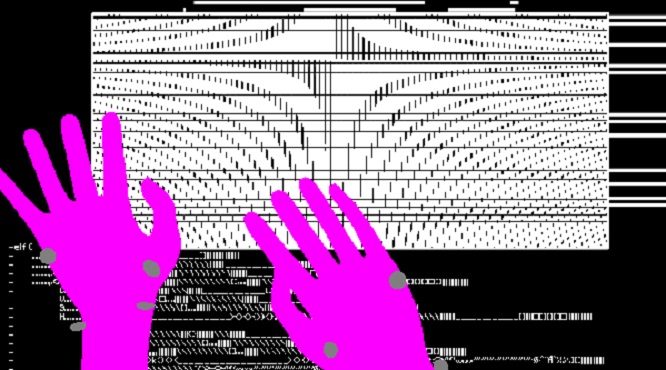
:: Nematodes (Peter Burr, 2018) [Labocine]
Should we expect the overworking comrades who rolled out the welcome mats to be treated decently? Rotterdam’s new strategy of hiring part-timers is familiar from post-secondary school systems and businesses around the world; here, it accompanies a casual shredding of history, personal relationships, lived networks. Hey, now that we’re all curators of our own music, clothes, friends and images, what’s the big deal? Anybody can throw together some movies, right? If I was one of the 40 dismissals, I’d be wondering if my labour was invisible, if the lifelong dedication to the most ephemeral form of movies has been met by little more than dismissive contempt by the winning circle. If the movies on display are meant to represent a vanguard of ethics, along with a vanguard of forms, could we expect that the inner workings of an organization should be reflected in the work being shown?
Peter Taylor, one of the many Rotterdam casualties, recounted a similar sacking ten years earlier of the entire programming staff at Worm, Rotterdam’s artist-run joint. No one said a word about it, of course, because Worm was one of the only places they could work as a programmer in town, so they hoped they might pick up some temp gigs by the very people who just fired them. At least the queenpins of Rotterdam have answered the question: is this a festival of bosses, or a festival of workers?
Should Rotterdam be boycotted? I know that artists are hurting, and that distribution has turned into an endless uphill trudge of negativity and refusal. But I don’t believe in “business as usual” because I don’t believe that the cinema I care for is about business. If cinema is truly “independent,” as it so often claims, then Rotterdam will be empty next year. Time to say no to the accountants, the managers, and the power brokers. But of course, neoliberalism means that artists should be thinking only about themselves. Fuck solidarity. Let the bosses rule. Let the hidden faces on the Board do whatever they want. Let them have everything.
Here’s an article that lays it out in a fair way, though the Web is a busy place, I’m sure you can find your own. Or better yet, write your own.

[1] Edo Dijksterhuis, “Massaontslag roept vragen op over toekomst IFFR,” Filmkrant, May 13, 2022 (https://filmkrant.nl/nieuws/reorganisatie-en-massaontslag-roepen-vragen-op-toekomst-iffr/)
[2] Quoted in: Eric Kohn, “Why the Film Industry Isn’t Doing Enough to Support Programmers,” IndieWire, May 7, 2022 (https://www.indiewire.com/2022/05/rotterdam-film-festival-fires-programmers-1234723001/#!)
[3] Flavia Dima, “On Curating Cinema in a World of Precarity | The State of Cinema,” Films in Frame, June 16, 2022 (https://www.filmsinframe.com/en/editorial/curatorship-precarity)
[4] Geoffrey Macnab, “Rotterdam’s restructure provokes debate as festival poised for revamp of programming team,” Screen Daily, May 10, 2022 (https://www.screendaily.com/news/rotterdams-restructure-provokes-debate-as-festival-poised-for-revamp-of-programming-team/5170260.article)
[5] Eric Kohn, “Why the Film Industry Isn’t Doing Enough to Support Programmers,” Indiewire, May 7, 2022 (https://www.indiewire.com/2022/05/rotterdam-film-festival-fires-programmers-1234723001/#!)
 |
envoyer par courriel | 
| imprimer | Tweet |
